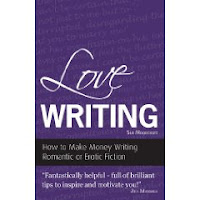 In an earlier interview, creative writing tutor and author, Sue Moorcroft spoke about her main concerns as a writer.
In an earlier interview, creative writing tutor and author, Sue Moorcroft spoke about her main concerns as a writer.She now talks about her latest non-fiction book:
How would you describe Love Writing: How to Make Money Writing Romantic or Erotic Fiction?
The title says it all, really.
We chose a title like that so that it would show up well in searches on-line. Readers of ‘how to’ books tend to search using phrases that describe the content of the book.
The book brings together many of the areas I work in:
- fiction writer
- non-fiction writer
- ‘how to’ writer
- creative writing tutor
- committee member of the Romantic Novelists’ Association
Having writing colleagues who had utilised their abilities in writing books on the craft of writing, it had occurred to me that, at some time, I might do the same.
Then two things coincided: I went through something in my personal life that made me find long fiction too emotionally demanding to write -- and I was invited out to a dinner at which Hazel Cushion of Accent Press would be present. Accent Press already published a selection of "how to write" books.
I told Hazel my idea and she asked to see a proper book proposal, after, in time-honoured fashion, we had roughed out some ideas on the back of an envelope. A few weeks later she accepted the proposal and offered a contract.
How long did it take you to write the book?
About seven months. Because I critique the work of distance learning students in the mornings, that would be afternoons. But I was also writing short stories and a serial and working on the edits for my novel, Starting Over.
You have to be versatile, in my game.
The proposal was where all the planning took place.
I began with chapter headings, which I played with until the order seemed logical, and then broke each one into sub-headings. That was pretty much the layout of the finished book, although I did consolidate a couple of chapters as they developed.
The publisher asked me to use my contacts in the world of romantic fiction to get input from other writers and industry professionals and I also collected some questions, mainly from unpublished writers. Getting these answered was a reasonable way of establishing what readers wanted to know.
I had to do a lot of research and that was really enjoyable -- reading on-line articles or debates, talking to speakers at conferences and so on.
I knew the wordcount that Accent Press wanted and I knew the ground that I wanted to cover. When I got to the end of the first draft of my planned subjects I had about 4,000 words too many. That was ideal, because I always cut quite hard when I’m polishing, which I feel creates pace. So I ended up bang on the money with the wordcount and about 15 days ahead of deadline.
Which were the most difficult aspects of the work that went into the book?
I was diffident about a couple of aspects of Love Writing.
The first was asking for quotes and input from published writers and industry professionals. However, I found that nobody seemed to mind being approached. A few refused nicely and said it wasn’t for them, a few just didn’t reply so I took that as a ‘no’. But the vast majority of them were happy to quote and, professionals that they are, went to great pains with their contributions. I’m grateful to them because their insight is gold dust.
My second reservation was whether I could write convincingly about areas I don’t write in, myself, such as speculative romance or hot erotica. But I discovered that it was possible to research these areas and canvass opinion, just like much non-fiction. I had a couple of segments read by writers in the relevant field and they okayed them, which gave me confidence.
What did you enjoy most?
Non-fiction is more black and white than fiction. There are answers to be found to questions. In that respect, it’s easier to write than grappling with the endless possibilities of fiction.
Love Writing is completely different to my other books, which were all novels, but I’d written ‘how to’ articles for writing magazines as well as two courses and a supplement for the London School of Journalism, so I felt Love Writing was a progression. A development.
I have an idea for another ‘how to’ book and Hazel at Accent is interested -- but I have to make certain that the material isn’t going to clash with another book they publish, before I write the proposal.
And I have another novel to finish, first…
Resources:Possibly related books:
,,
Related article:
- Sue Moorcroft [Interview: 1 of 3], Conversations with Writers, March 10, 2009
- Sue Moorcroft [Interview: 3 of 3], Conversations with Writers, February 26, 2010
- Dave and Lillian Brummet [Interview: 1 of 2], Conversation with Writers, October 19, 2009

No comments:
Post a Comment